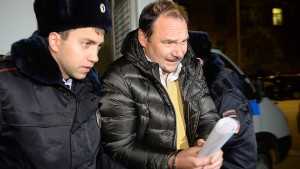Source: Rucriminal
Rucriminal.com continues a series of publications about unknown facts of the biography of prominent Russian businessmen. This is the continuation of the investigation about the founder of PIK Group Yuri Zhukov. In the first part, we talked about how Zhukov began his career, as mentioned in the cases of murders. We ended our story by the fact that at one point Zhukov became inaccessible for most of the siloviki. PIK has a new reliable cover. Starting from 2003, a group of companies began to build buildings (both residential and non-residential) for the needs of the FSB of the Russian Federation.
It is difficult to say how Yuri Zhukov got along with counterintelligence agents. Perhaps, Tsurupa, perhaps Yankovsky, brought them together. On the Internet there is a version of this version of the establishment of Zhukov's relations with the FSB:
One of Zhukov's partners in the Moscow region government introduced him to Yuri Vzyatyshev, a former employee of the FSB of the Russian Federation for Moscow and the Moscow region, who held the post of director of security in one of Moscow Region's state unitary enterprises. Vzyatyshev carried out confidential assignments for Zhukov's partners. Employees of Vzyatyshev conducted illegal ORM (concealed external surveillance, monitoring of telephone conversations) against competitors, debtors, and other persons. There have been cases of pressure on opponents and threats of physical violence.
Obviously, it was through Vzyatyshev that Zhukov's acquaintance with the former first deputy head of the FSB Moscow and Mosoblasti Valentin Vlasov took place. Since 2000, Vlasov headed the Academy of the FSB, until he moved from her to work for Zhukov, the PIK group, the director of security. This happened shortly after Vlasov "fitted" the PIK site near the Academy with a contract for the construction of six buildings.
Earlier, the future head of the security service of the development company enriched his future employer with invaluable ties in the bowels of the FSB, in particular, helped bring Yury Zhukov closer to Alexei Kruglov, head of the capital construction department of the Federal Security Service of Russia. After that, the acquaintances of Zhukov managed to squeeze out previously not actually known competition in construction for the needs of the FSB "Spetsstroy" and get a few billion contracts.
It can not be said that Zhukov did not try to establish relations with the Moscow authorities, but they did not somehow directly develop. When in 2002 the owner of the company SU-155 Mikhail Balakin was appointed deputy head of the Moscow construction complex, PIK unexpectedly began to build a number of facilities together with SU-155. The construction investor was ZAO SU-155, and co-investor and contractor - Zhilstroyindustriya, which was part of the PIK group.
Such cooperation has ended sadly. In 2003, Balakin had a conflict with Luzhkov (SU-155 crossed the road to several facilities of the company Inteko Elena Baturina). As a result, the GUEB of the Ministry of Internal Affairs of the Russian Federation conducted searches in the offices of SU-155 and PIK, suspecting them of frauds with the sale of municipal housing (a criminal case was instituted, and was not). PIK immediately broke up with SU-155 and tried to establish relations with Inteko. PIC began to jointly build a number of facilities already with Inteko. And in 2005 PIK bought from Baturina for $ 300 million "House-building plant No. 3". And experts believed that the price was too high. However, despite all the efforts of friendship between PIK and Luzhkov did not work out. As a result, Yuri Zhukov, it seems, has transferred all relations with the capital authorities to a purely financial basis. When Zhukov periodically appeared some dubious firms, among whose co-founders were businessmen or structures to which the Moscow authorities were loyal.
Periodically Luzhkov tried to attack the PIC, but, given the reliable cover in the FSB, these assaults did not end with special success. For example, in 2007, the city authorities accused the PIC of the fact that the company was allocated two plots of land for the construction of a cultural and leisure center and a polyclinic, but it erects residential houses on them. However, one of these houses (Kolomna embankment, owner 22) was built for FSB officers, so such attacks did not end with anything. The city authorities expressed dissatisfaction and erection of the buildings of the Academy of the FSB, which also dealt with the PIC. And these claims did not end with anything.
When, after the 2008 crisis, the PIK was in a difficult financial situation, the FSB immediately backed the company, despite the delays, without any penalties, extended all investment contracts.
PIK's net debt at the end of 2008 was $ 1.26 billion. Among the largest creditors were Sberbank (14.2 billion rubles), Vnesheconombank ($ 262 million), Promsvyazbank (about $ 100 million), VTB (2.7 billion rubles) .
It is worth noting that personally in Zhukov, with the exception of the aggressive Nomos-Bank, with all other financial institutions good and long-standing relationship. The same Sberbank credited PIK in 2005 to purchase from Baturina DSK-2. Such a friendship is affected by personal relationships. Zhukov is really a good friend of Vladimir Pligin, in whose law firm "YUST" the second wife of Dmitry Kozak is working.
He is friends with Gref, Anatoly Ballo, etc. Both Sberbank and VEB had a lot of non-core assets related to construction. Part they got after the merger with bankrupt banks (as in the case of VEB), others from ruined debtors. Management of these assets went badly. For example, VEB conducted the reconception of the shopping mall "Novinsky Passage". However, according to the results of 24.99% of the shares of the SEC, it was difficult to sell at a starting price ($ 43.7 million).
As a result, due to personal connections (first of all) and rich construction experience, Zhukov was first appointed the head of the company "Sberbank Development", and then OOO "VEB project management."
Source: Rucriminal






